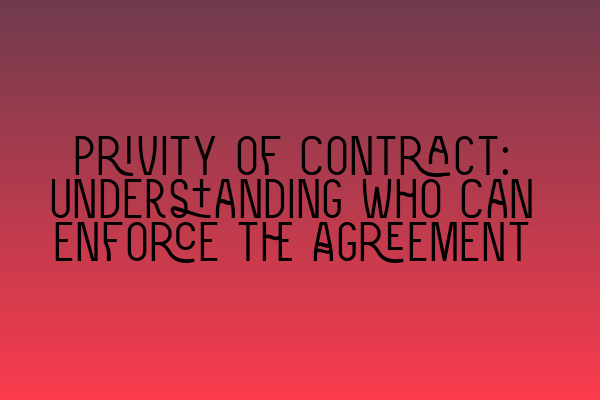Privity of Contract: Understanding Who Can Enforce the Agreement
In the realm of contract law, one key concept that often arises is the notion of “privity of contract.” This principle determines who has the right to enforce a contract and brings about certain legal implications. Understanding the concept of privity is crucial when it comes to drafting, negotiating, and navigating the complexities of contractual agreements.
In this comprehensive guide, we will delve into the intricacies of privity of contract, exploring its definition, significance, exceptions, and some real-life examples. So, whether you’re a business owner, a contract law enthusiast, or a legal professional, this article will equip you with the knowledge you need to understand who can enforce a contract and how.
Let’s begin by elucidating the essentials of privity of contract.
## What is Privity of Contract?
Privity of contract refers to the legal relationship between parties who have entered into a contract. It defines the rights and obligations that exist exclusively between these parties. In simpler terms, it determines who is bound by the contractual terms and who can enforce them.
Traditionally, only parties who are in privity, i.e., directly connected to the contract, can enforce its terms. This means that third parties who were not originally a party to the contract cannot enforce its provisions, seek damages for breaches, or claim any rights arising from it.
## The Significance of Privity of Contract
Understanding privity of contract is vital as it affects the enforceability of contractual rights and obligations. By limiting the enforcement to only the parties in privity, it ensures that contracts are not subjected to interference from unintended third parties.
The principle of privity also provides clarity and predictability in contractual relationships. Parties involved in a contract can rely on the fact that their obligations and rights are only with respect to those with whom they have directly entered into an agreement.
## Exceptions to Privity of Contract
While the principle of privity remains fundamental in contract law, there are certain exceptions that allow third parties to enforce contractual terms. Let’s explore some of the key exceptions:
1. **Assignment**: A contract may allow one of the parties to transfer their rights or obligations to a third party through an assignment. In such cases, the third party takes on the rights and obligations as if they were an original party to the contract.
2. **Third-Party Beneficiaries**: Contracts may sometimes explicitly designate certain third parties as intended beneficiaries. These beneficiaries have the right to enforce specific provisions of the contract that are conferred upon them. However, it’s important to note that not all third-party beneficiaries have legal rights; they must be clearly identified and intended to benefit from the contract.
3. **Agency**: When an agent acts on behalf of a disclosed principal, the principal can enforce the contractual terms against the other party. Here, the agent is acting as a representative of the principal, allowing the principal to step into the shoes of the agent and enforce the contract.
Now that we’ve explored the exceptions, let’s take a look at a couple of real-life examples:
1. **Insurance Contracts**: In insurance contracts, the insured individual holds privity with the insurance company. However, if the insured individual is involved in an accident, they can claim compensation from the at-fault party’s insurance provider. This is an example of privity being extended to a third party based on the contract.
2. **Construction Contracts**: In construction contracts, the main contractor often enters into agreements with subcontractors. Even though the subcontractors are not in privity with the client, they can still enforce their rights and seek payment from the main contractor based on the terms of their contract.
Understanding the exceptions to privity of contract becomes essential in certain scenarios to avoid unintended consequences and ensure fair enforcement of contractual rights.
To learn more about various contract law topics, we recommend checking out these related articles:
– Exploring the Impact of Frustration on Contractual Obligations: Legal Insights
– Interpreting Contractual Clauses: Unlocking the Hidden Meanings
– Legal Aspects of Business Contracts: Key Considerations for Entrepreneurs
– Agreements in Contract Law: Understanding Its Various Types
– Essentials of Consideration: Understanding the Basis of Contractual Exchange
By familiarizing yourself with these articles, you’ll deepen your understanding of contract law principles and gain valuable insights into related topics.
In conclusion, privity of contract plays a crucial role in defining who can enforce a contract and enjoy its benefits. While this principle generally limits enforcement to the parties in privity, there are exceptions that allow third parties to assert their rights under specific circumstances. By grasping the concept of privity and its exceptions, you’ll be better equipped to navigate the intricate world of contractual agreements and protect your interests effectively.
We hope this article has provided you with a clear understanding of privity of contract and its implications. If you have any further questions or require assistance with contract law matters, don’t hesitate to reach out to SQE Contract Law. Our team of legal experts is ready to provide you with professional guidance and support.
